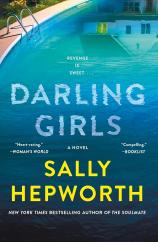Darling Girls
Review
Darling Girls
There are several mysteries in Sally Hepworth's new novel, DARLING GIRLS. The first, and the vehicle she uses to bring the main characters back to their childhood foster home of nightmares, is the bones found buried under the large farmhouse where they lived. Holly Fairchild --- Miss Fairchild to Jessica, Norah and Alicia --- took in foster children. It was decades later, when she sold the house and it was demolished, that the bones were discovered.
Jessica, Norah and Alicia return to the site of the house together. While there are no blood ties between the girls, all of whom are women now, they are as close as --- or even closer than --- real sisters because of the shared trauma they endured. Miss Fairchild seemed to be a lovely lady who was pretty, charming and openly affectionate on the rare occasions that others were present. But once they were alone, the "pretty" mask came off, and what was underneath was the stuff of nightmares.
"[E]ven as we think we understand what has happened and why, Hepworth is not done with the surprises as she deftly flips the rug over to show us that what we thought we were seeing is not the truth at all..."
Jessica suffered the most from the abuse and cruelty because at first Miss Fairchild was loving and kind. She insisted Jessica call her Mummy. She spoiled Jessica, who slept with her and didn't leave her side at all. But when Jessica started school and made friends, Miss Fairchild changed. She turned into a monster, not allowing Jessica to do anything outside of school, withholding food and demanding that Jessica clean the already immaculate house. She controlled every moment of Jessica's time.
When first one girl and then another arrived, Miss Fairchild was treated to additional children to torture. Her methods were diabolically clever, and the details sound rather benign. But the manner in which Hepworth describes them are chilling. The only bright spot was that they had each other. When they finally joined forces to free themselves from Miss Fairchild, their lives already had been changed by the cruelty that was inflicted on them by their monstrous foster mother.
Now, while they are outwardly successful, each woman has a personality flaw that inhibits her from seeking happiness and contentment. While they work and support themselves, they are living half-lives. Jessica is married, but her relationship with her foster sisters takes precedence over her marriage to a very nice man, which suffers. Norah still has huge anger management problems and has been arrested multiple times for assault. Alicia is unable to think that she is worthy of love, so she lives alone.
As we expect from Hepworth, DARLING GIRLS is perfectly plotted. We find out more about these women in chapters told from each of their points of view, in both the past and the present. But there are also mysterious conversations that someone --- we don't know who --- is having with a therapist. Through these cryptic exchanges, we learn more about the motives and background of Miss Fairchild and Wild Meadows Farm, where the story is mostly set.
But even as we think we understand what has happened and why, Hepworth is not done with the surprises as she deftly flips the rug over to show us that what we thought we were seeing is not the truth at all, but rather a cleverly constructed tale to entertain. The ending is brilliant thanks to the superb plotting and pacing of the whole of the book that precedes it.
Reviewed by Pamela Kramer on April 26, 2024
Darling Girls
- Publication Date: March 4, 2025
- Genres: Domestic Thriller, Fiction, Suspense, Thriller, Women's Fiction
- Paperback: 368 pages
- Publisher: St. Martin's Griffin
- ISBN-10: 1250371708
- ISBN-13: 9781250371706




